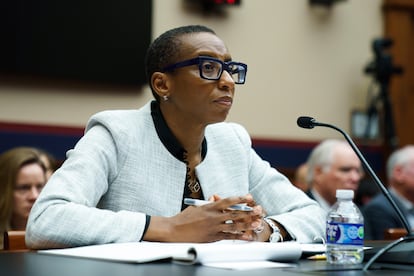Harvard’s president resigns after campus antisemitism controversy and plagiarism accusations
Claudine Gay has denounced racist threats following her appearance at a congressional hearing in early December to discuss antisemitism on campuses


The president of Harvard University, Claudine Gay, resigned on Tuesday, barely six months after taking office, after a fierce controversy surrounding alleged antisemitism on campus, as well as in other elite U.S. schools, and accusations of plagiarism in her own academic works. Her tenure as the institution’s first Black president became also the shortest in the university’s history.
“After consultation with members of the Corporation [the highest governing body at the helm of Harvard], it has become clear that it is in the best interests of Harvard for me to resign so that our community can navigate this moment of extraordinary challenge with a focus on the institution rather than any individual,” Gay said in an email to students and faculty.
In her message, Gay claims to have been the victim of personal attacks and racist threats following her appearance at a congressional hearing on December 5, after which she was accused of not speaking out strongly enough against alleged antisemitism on campuses in the wake of the Hamas attacks in Israel on October 7 and Israel’s bloody offensive in Gaza in response. “It has been distressing to have doubt cast on my commitments to confronting hate and to upholding scholarly rigor — two bedrock values that are fundamental to who I am — and frightening to be subjected to personal attacks and threats fueled by racial animus.”
Resigning “is not a decision I came to easily,” she stressed in the letter. “My deep sense of connection to Harvard and its people has made it all the more painful to witness the tensions and divisions that have riven our community in recent months, weakening the bonds of trust and reciprocity that should be our sources of strength and support in times of crisis.”
Her tenure was the shortest in the institution’s history. Gay had assumed the post last July. The daughter of a Haitian immigrant family, she had managed to make her way into the exclusive world of elite universities and become the first Black president of Harvard, one of the world’s most renowned institutions of higher education. Until then a professor of political science at Stanford, her appointment was hailed as a milestone against racism and racial inequality, highlighted socially by the murder of George Floyd at the hands of the police in 2020.
Despite its brevity, her term as president has been shrouded in controversy. A controversy that is closely linked to the culture wars in the United States between Republicans and Democrats, and which reached its peak during Gay’s appearance and that of the presidents of the Massachusetts Institute of Technology (MIT) and the University of Pennsylvania at a hearing in Congress to discuss antisemitism on American campuses on December 5. On that day, Republican Congresswoman Elise Stefanik — a Harvard graduate who had been expelled by the university from an advisory committee for her support of Donald Trump’s false claims of voter fraud in the 2020 election — demanded that the three presidents make a statement on whether they would punish students who call for genocide against Jews.
The three avoided answering with a categorical “yes” or “no” and tried to express that the reaction would depend on the context; an attitude which earned them accusations of behaving in an elusive manner and calls for their resignation. The White House itself criticized the academics’ responses: “It’s unbelievable that this needs to be said: calls for genocide are monstrous and antithetical to everything we represent as a country,” said its deputy spokesman, Andrew Bates, in a statement the day after their appearance in Congress. University of Pennsylvania president Liz Magill resigned a few days later.
Following that appearance, the Republican-controlled House Education Committee announced an investigation into antisemitism at Harvard. Almost immediately after, it revealed that it had expanded the inquiry to also examine allegations of Gay’s alleged plagiarism in four of her academic works over the course of a quarter-century, including her doctoral dissertation.
The commission had requested a number of documents from the university, although it had extended the deadline to receive them given that the school is on vacation. The Harvard Corporation itself had admitted that Gay’s papers contained “duplicative language without appropriate attribution” and the president had incorporated seven clarifications to the writings under suspicion.
Sign up for our weekly newsletter to get more English-language news coverage from EL PAÍS USA Edition
Tu suscripción se está usando en otro dispositivo
¿Quieres añadir otro usuario a tu suscripción?
Si continúas leyendo en este dispositivo, no se podrá leer en el otro.
FlechaTu suscripción se está usando en otro dispositivo y solo puedes acceder a EL PAÍS desde un dispositivo a la vez.
Si quieres compartir tu cuenta, cambia tu suscripción a la modalidad Premium, así podrás añadir otro usuario. Cada uno accederá con su propia cuenta de email, lo que os permitirá personalizar vuestra experiencia en EL PAÍS.
¿Tienes una suscripción de empresa? Accede aquí para contratar más cuentas.
En el caso de no saber quién está usando tu cuenta, te recomendamos cambiar tu contraseña aquí.
Si decides continuar compartiendo tu cuenta, este mensaje se mostrará en tu dispositivo y en el de la otra persona que está usando tu cuenta de forma indefinida, afectando a tu experiencia de lectura. Puedes consultar aquí los términos y condiciones de la suscripción digital.








































